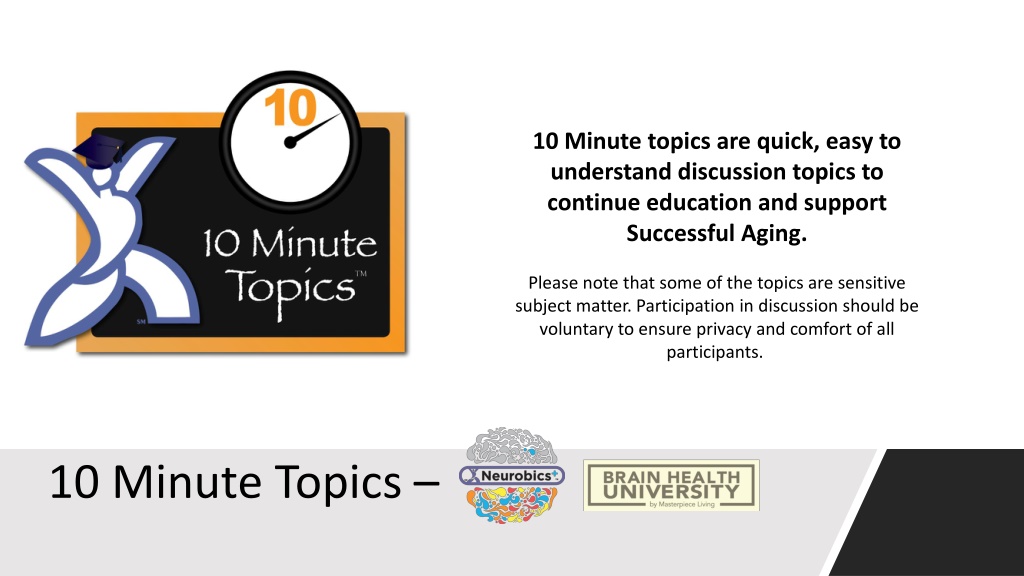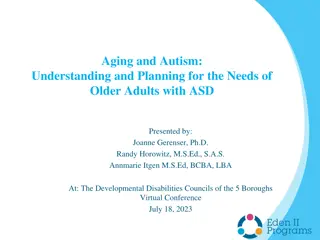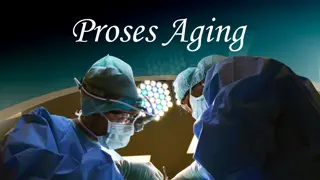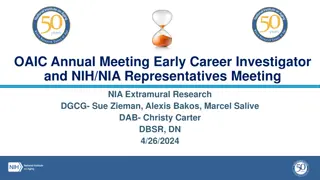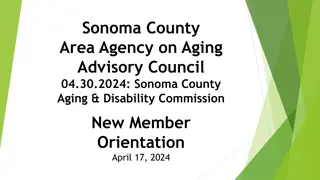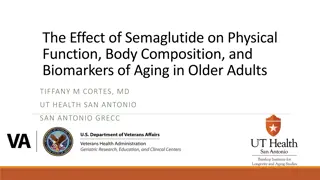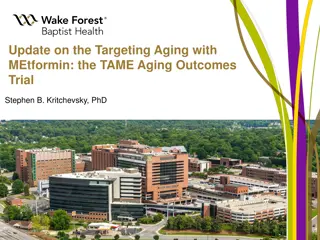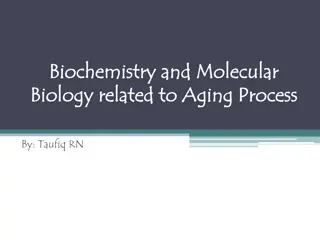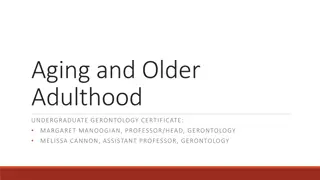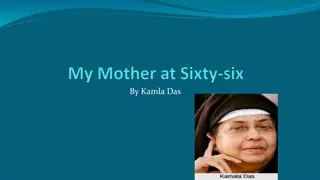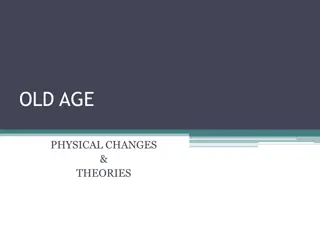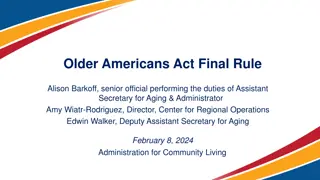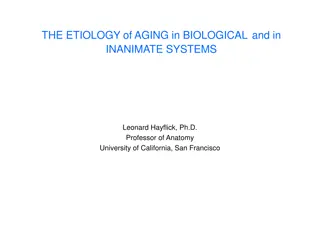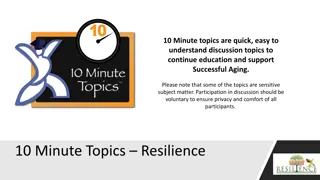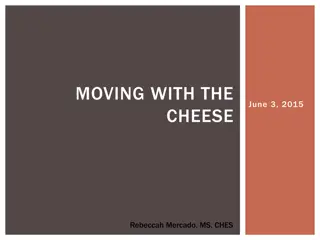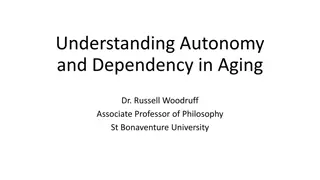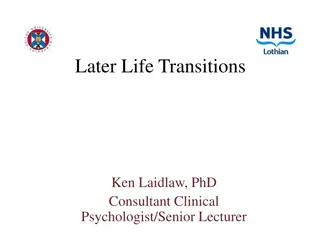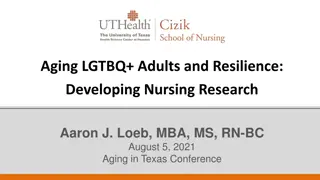Quick and Easy Topics for Successful Aging
Explore a range of quick, easy-to-understand topics to support your journey towards successful aging. Dive into sensitive subjects designed to promote ongoing education and personal growth.
Download Presentation

Please find below an Image/Link to download the presentation.
The content on the website is provided AS IS for your information and personal use only. It may not be sold, licensed, or shared on other websites without obtaining consent from the author.If you encounter any issues during the download, it is possible that the publisher has removed the file from their server.
You are allowed to download the files provided on this website for personal or commercial use, subject to the condition that they are used lawfully. All files are the property of their respective owners.
The content on the website is provided AS IS for your information and personal use only. It may not be sold, licensed, or shared on other websites without obtaining consent from the author.
E N D
Presentation Transcript
10 Minute topics are quick, easy to understand discussion topics to continue education and support Successful Aging. Please note that some of the topics are sensitive subject matter. Participation in discussion should be voluntary to ensure privacy and comfort of all participants. 10 Minute Topics
Neurobics+ by Masterpiece Living Neurobics is a term coined by Lawrence Katz and Manning Ruben that means exercise for your brain. Masterpiece Living created an eleven-week memory enhancement course that engages people in Neurobics. It is important that as we age we learn how we can improve the effectiveness of our memory and use it to its fullest potential. ________________________________________________ Discussion Questions: If you have heard the group talking about Neurobics+, what have you heard? What are ways that you challenge your brain? How can you help spread the word about Neurobics+ by Masterpiece Living? Activity: Write your first name with your non- dominant (non-writing) hand. With a second paper try writing your first name with both hands at the same time. Try it with your last name.
The Lifestyle Review The Lifestyle Review looks at whole-person wellness. It takes a snap-shot of physical, intellectual, social and spiritual activities. It was designed by the Masterpiece Living advisory board to provide people with feedback about their successful aging endeavors. This process is different for each person. The report for the Lifestyle review highlights strengths and opportunities in the four areas of wellness. __________________________________________________ Discussion Questions: How do you ensure that you are reaching balance in your life? What are the benefits of taking the lifestyle review? How can we get the word out about the lifestyle review so that they can take advantage of this resource? (Facilitator note: have copies of the Lifestyle Review available to look through)
Meditation To meditate means to engage in reflection or contemplation. Meditation can be done in many ways. Benefits of meditation include improved attention and focus, better sleep, increased energy levels, lowered blood pressure, pain management, and stress relief. These benefits are especially important for older adults as some of these topics become issues with aging. __________________________________________________ Discussion Questions: How do you meditate? How can you make time during your day for relaxation, meditation or reflection? How can you share what you have learned about meditation with others?
Memory Loss True or False? Memory loss is just a fact of life for everyone. The answer is false. In fact, there are many parts of the brain in which brain cells are not lost. The brain is reshaped as we age. Brains do not run out of brain cells, it is even possible to grow new brain cells and create new connections! So, no matter how old you are, research tells us that you can produce new brain cells that help form new memories. We can even make our brains denser which reduces the risk of Alzheimer s Disease. __________________________________________________ Discussion Questions: What do you do to challenge your brain and help grow new brain cells? What ways could we incorporate more intellectual challenge into our daily lives?
Book Club Some of the best learning that took place in your education years was knowledge and insight gained from book reports. Just as you did in school you can continue your quest for knowledge by reading books from your community library or sharing with a friend. Consider joining or forming a book club to take the experience to a higher level as you can read individual books and report on them or have the group read the same book and have weekly discussions. Chances are everyone brings something different to the table each week and the discussions become very engaging! __________________________________________________ Discussion Questions: How might you go about starting a book club at our community? Do you enjoy discussing books with others individually or with a group? How might reading books individually or as a group be different now as opposed to when you read books in school?
Aerobic Activity (Facilitator: Begin with this topic with the 30 second Sit to Stand activity from the Mobility Review. Have participants cross their arms over their chest and count how many times they can go from a seated to standing position in 30 seconds) Can you walk or jog a mile? Walking and jogging are examples of aerobic activities. Research has shown that older adults can remain healthy and live longer independently by maintaining and improving their aerobic fitness. Studies show the benefits of aerobic activity include less risk of heart disease and stroke, control of diabetes, protection from bone loss, lower blood pressure and cholesterol, and better digestive function. Low levels of aerobic activity in older adults indicate a high risk of an early death. Participating in regular physical activity that is challenging is part of the Masterpiece lifestyle. The benefits are more than just physical. As you have probably heard, what s good for the heart is good for the brain! _____________________________________________ Discussion Questions: What types of aerobic activities do you do on a regular basis? What benefits have you experienced from aerobic activity? How can you help others increase their aerobic activity? What are your future plans for including aerobic activity in your daily life?
Internet Searches Research shows that doing internet searches, especially people learning this as a new skill, improves brain function. The same parts of the brain that control language, reading, memory, and visual abilities are all activated during internet searches. _______________________________________________ Discussion Questions: What are some of the other benefits of using the computer? What are some of the reasons people choose not to use computers? How can we increase computer usage among others at our community?
Mental Function Myth and Fact Have you ever heard the expression you can t teach an old dog new tricks ? What does that mean? This is a myth that at certain ages it s too late to challenge yourself or learn new things. But the research tells us that our capacity to grow and learn continues throughout life. According to successful aging research, there are three features that predict strong mental function in old age: 1. Regular physical activity 2. A strong social support system 3. Belief in one s ability to handle what life has to offer. _______________________________________________ Discussion Questions: How do you plan to stay continually mentally engaged throughout life? Of the three predictors of mental functioning, which is most important to you? How can you find balance among the three predictors of mental functioning?
Video Games Video games have rendered good results for older adults who engaged in games that stimulate brain activity. A new generation of games has surfaced for those who want to reap the mental and physical benefits of playing. Benefits include improved memory and brain function which protects against age-related cognitive decline and promotes gains in memory, attention, agility, and hand-eye coordination. A few examples of games that are fun, engaging and have a positive effect on memory and ability are Brain Age, Posit Science, and various active games for the Wii. _________________________________________________ Discussion Questions: How often do you play video games? How can you encourage others to participate in these types of video games? What are some good games for brain and physical function?
Card Games What s your favorite card game? Maybe you didn t know that people who participate in brain-engaging activities such as card games can reduce their risk of developing Alzheimer s disease. Research shows that older adults who participated in activities that get the brain working, such as playing cards, maintained memory and information processing abilities better than those who did not. Most people play cards because they enjoy doing so and the intellectual benefits are an added bonus to the enjoyment! Most communities have groups that meet regularly to play cards and socialize. ________________________________________________ Discussion Questions: What types of group card game activities does our community offer? What types of card games do you enjoy playing on a regular basis? What are some of the barriers that keep you from playing card games? Facilitator note: Set up a quick card game to play during this session or sometime throughout the week.
Art Therapy Art can have a healing effect. Different kinds of art, from painting to sculpture, can be used as therapy, and this has worked well for people with dementia. In general, art has a positive effect on everyone, as it is often a social activity, can be mentally challenging and brings meaning and purpose for many people. ____________________________________________________ Discussion Questions: What types of art programs are offered at your community? How can you encourage more people to participate? Is art a part of your life? Is there something artistic you would like to learn?
Music Music is a very important part of most people s lives and is integrated into the fabric of daily life in almost every culture. Research has shown that music can be a tool that promotes brain activity, relaxation, social interaction and reminiscencing. It has also been shown to be beneficial for older adults with memory issues. No matter your age, music can be used to create a positive and relaxing environment for almost any mood. ____________________________________________________ Discussion Questions: What kind of activities does our community offer to help ward off Alzheimer s disease What are some of the activities you engage in on a regular basis that are intellectually stimulating? How can you share what you have learned about Alzheimer s disease? (Brainstorm this question and encourage group members to talk to someone about what they have learned and report back next group meeting.) (Facilitator: visit www. www.alz.org for more facts, figures and information)
Mindfulness Mindfulness is a type of active meditation where a person becomes keenly aware of their surroundings and senses. Being mindful requires awareness without judgment. It s about being present in the moment. Practicing mindfulness has health benefits as well. It has been linked to improvements in cognitive and immune system functioning. Practice being mindful by trying the exercise below. Mindfulness exercise: Sit comfortably and clear your mind of unrelated thoughts. Become present in the moment by looking around you. Notice the colors and shapes of the images you see. Don t judge what you see, just notice it. Next, bring into your awareness the sounds around you. Listen without trying to understand the sounds. Just simply notice the sounds you hear. Take a deep breath and become aware of the smells around you. Slowly, inhale and exhale the air as you continue to notice the aromas around you. Become aware of your sense of feeling as you feel the air your skin and the climate that surrounds you. Continue to breathe slowly while sitting with increased awareness of your surroundings. ____________________________________________________ Discussion Questions: What did you notice while participating in the mindfulness exercise? How could you incorporate mindfulness into your daily routine?
Alzheimers Disease True or False: Every older adult gets Alzheimer s disease (AD) sooner or later? False, research says that 10% of people age 65 and older have AD. The risk gets higher as people age. If AD runs in the family, a person could have up to a 50/50 chance of getting it. Someone with AD not only has memory loss, but problems with speech, behavior, and other brain-related abilities. However, there are things people can do to prevent AD such as physical activity, brain exercises and good nutrition. Researchers are working very hard to find a cure, until then, we must do what we can to prevent AD or delay the symptoms. ____________________________________________________ Discussion Questions: What kind of activities does our community offer to help ward off Alzheimer s disease What are some of the activities you engage in on a regular basis that are intellectually stimulating? How can you share what you have learned about Alzheimer s disease? (Brainstorm this question and encourage group members to talk to someone about what they have learned and report back next group meeting.) (Facilitator: visit www. www.alz.org for more facts, figures and information)
Physical Activity and Dementia Exercise has many incredible impacts on our health. A study found that people who reported engaging in moderate to heavy levels of physical activity had about a 40% lower risk of developing any type of dementia.How you spend your time today truly impacts your future. ___________________________________________________ Discussion Questions: How can you increase your physical activity today? How might you encourage others to become more physically active? What opportunities exist for physical activity at our community? Perhaps you d like to try something new. What prevents you from doing so?
Memory Loss There are changes that happen with aging. However, most of the loss that is experienced in the usual aging process is preventable, caused by lifestyle choices. You have probably heard this as it relates to physical effects, but this goes for mental function as well. In the MacArthur study on successful aging, older men and women who were showing clear cognitive decline showed substantial improvement after just five topic sessions. Best of all, this improvement was maintained in follow-up testing. So, the bottom line is, difficulty with memory is usually due to lack of practice and anyone, young or old, can improve cognitive function. _________________________________________________ Discussion Questions: What can you do to keep your brain sharp as you age? What opportunities exist at our community to help us keep our brains sharp? How might you encourage others to participate more in intellectual programs and activities?
Quick Tips These topics are meant to spark conversation among a group They are designed to be integrated into: Group meetings Community meetings Leadership meetings Town Halls And more! These are quick and efficient way to keep successful aging in the forefront of team members and residents' minds and to continually aid the community in applying the concepts they are learning. We encourage you to supplement the topics with news articles, additional information and exercises. For References please refer to the 10 Minute Topics References document on the Masterpiece Living Website
